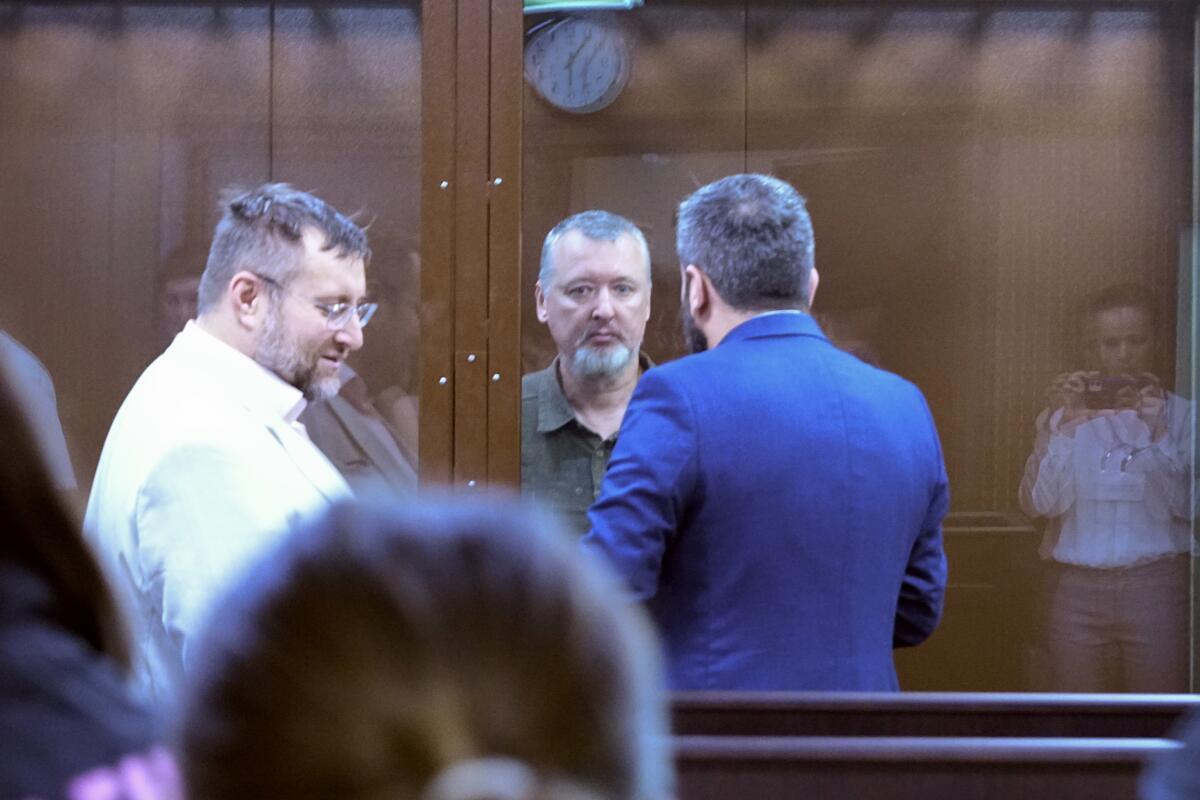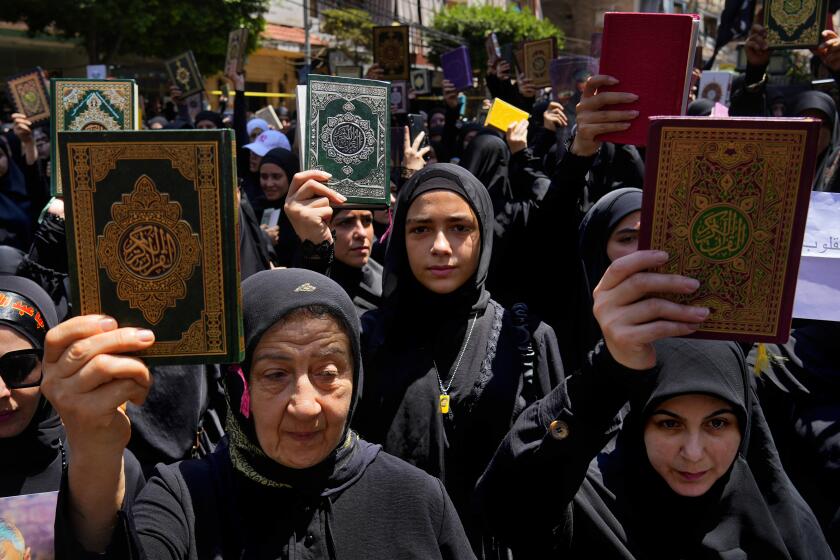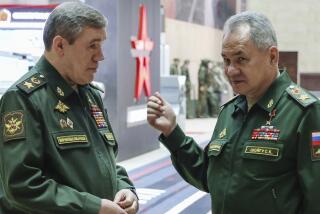Russia arrests a hard-line nationalist who accused Putin of weakness in Ukraine

- Share via
MOSCOW — A prominent hard-line nationalist who accused Russian President Vladimir Putin of weakness and indecision in Ukraine was arrested Friday on charges of extremism, a signal the Kremlin has toughened its approach with hawkish critics after last month’s abortive rebellion by the Wagner mercenary company.
Igor Strelkov, a retired security officer who led Moscow-backed separatists in eastern Ukraine in 2014 and also was implicated by the Netherlands in the downing of a Malaysia Airlines passenger jet that year, has argued that a total mobilization is needed for Russia to achieve victory. He recently criticized Putin as a “nonentity” and a “cowardly mediocrity.”
Moscow’s Meshchansky District Court ordered the 52-year-old Strelkov, whose real name is Igor Girkin, to be held in custody for two months pending an investigation of charges of making calls for extremist activities. He faces up to five years in prison if convicted.
Strelkov rejected the charges, but asked the judge to place him under house arrest, citing health issues.
Thousands of people took to the streets in some Muslim-majority countries to express their outrage at the desecration of a copy of the Quran in Sweden.
Strelkov’s arrest comes nearly a month after a short-lived mutiny launched by mercenary chief Yevgeny Prigozhin that saw his Wagner troops capture military headquarters in the southern city of Rostov-on-Don and then drive as close as 125 miles to Moscow to demand the ouster of Russia’s top military leaders. Prigozhin agreed to end the June 23-24 rebellion under a deal that offered an amnesty to him and his mercenaries and allowed them to move to Belarus.
The revolt posed the most serious threat to Putin’s 23-year rule, eroding his authority and exposing government weakness.
Like Prigozhin, Strelkov harshly criticized Russia’s military leaders for incompetence, but he also denounced the Wagner chief and described his action as treason and a major threat to the Russian state. The two repeatedly had traded insults, and Strelkov’s supporters said a criminal inquiry into his statements has been initiated by one of Wagner’s mercenaries.
Strelkov has more than 875,000 subscribers on his messaging app channel. The Club of Angry Patriots, a recently created hard-line group he belonged to, issued a statement protesting his detention as a “provocation” that “undermines the population’s trust in law enforcement organs” and “carries extremely negative consequences for the country’s stability.”
Strelkov served in the Russian military during the Chechen separatist wars and later joined the country’s top domestic security agency, the Federal Security Service, where he reached the rank of colonel.
After he retired from service, he took part in the Kremlin’s illegal annexation of Ukraine’s Crimean peninsula and then led fighters in eastern Ukraine during the first months of a Moscow-backed separatist rebellion there in 2014.
Last year, a Dutch court convicted him and two other men of murder for their role in shooting down Malaysia Airlines Flight 17 with a Russian surface-to-air missile, killing all 298 people aboard the aircraft as it flew over a separatist-controlled region of eastern Ukraine on July 17, 2014.
They were convicted for their role in bringing the Buk air defense missile system from a Russian military base into Ukraine and putting it into position for its launch.
The Dutch Public Prosecution Service said it was watching the developments “with interest, although we cannot verify what is going on.”
“We would, of course, like nothing more than for this man, who has been sentenced to life imprisonment in the Netherlands, to serve his prison sentence here. The victims of MH17 and their relatives deserve that,” the statement said. “But the fact is that Russia does not extradite its citizens, and this event unfortunately does not bring that any closer.”
Strelkov, whose adopted name is rooted in the word “shooter,” had a penchant for war history and was among the Russians who take part in military reenactments, appearing in the uniform of an imperial Russian officer from World War I and toting historical weapons.
Amid the fighting in Ukraine, he has mocked Russian Defense Minister Sergei Shoigu as a “plywood marshal,” an apparent reference to Shoigu’s hobby of woodcutting.
Strelkov long has spoken with contempt about Putin, accusing him of incompetence and kowtowing to Western interests, and he toughened his criticism after the start of Moscow’s action in Ukraine.
He predicted Russia would face imminent defeat because of Putin’s reluctance to declare a massive mobilization and put the country on full military footing.
“A lot of empty talk, the minimum of action and the utter lack of responsibility for failures — that is Putin’s style of late,” Strelkov said recently. “A nonentity that has managed to cheat a large part of the population has been at the country’s helm for 23 years.”
He warned that “the country will not survive another six years under the rule of that cowardly mediocrity,” a reference to Putin’s expected bid to run for another six-year term in a presidential vote in March 2024.
Tatiana Stanovaya, a senior fellow at the Carnegie Russia Eurasia Center, said Wagner’s rebellion has given the military brass an opportunity to go after its critics.
“Strelkov had overstepped all conceivable boundaries a long time ago, sparking the desire among security forces — from the FSB to military chiefs — to apprehend him,” she said on Twitter. “This is a direct outcome of Prigozhin’s mutiny: the army’s command now wields greater political leverage to quash its opponents in the public sphere.”
She predicted that while “it’s unlikely that there will be massive repressions against ‘angry patriots,’ ... the most vehement dissenters may face prosecution, serving as a cautionary tale for others.”
More to Read
Sign up for Essential California
The most important California stories and recommendations in your inbox every morning.
You may occasionally receive promotional content from the Los Angeles Times.














